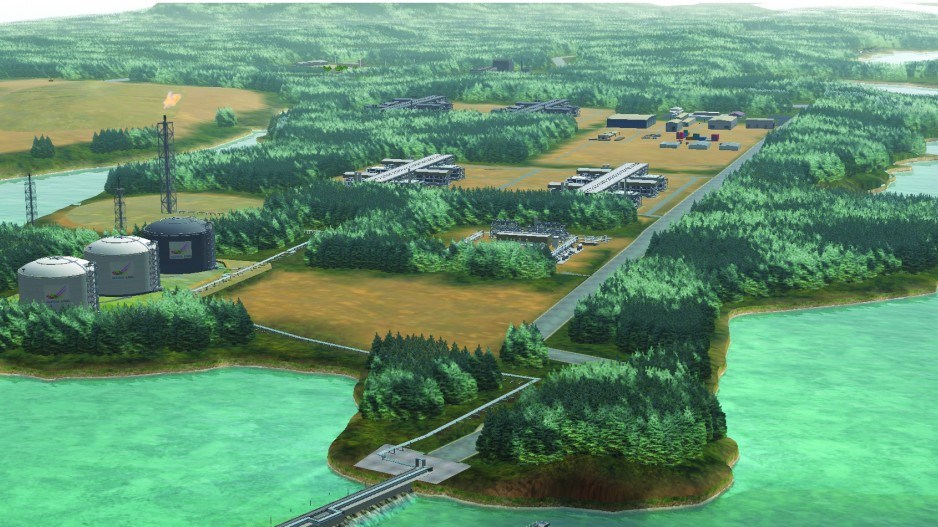Nexen, owned by China’s CNOOC Ltd. (NYSE:CEO), announced today Sept. 14 that is is calling a halt to the feasibility study that was underway on its Aurora LNG plant on Digby Island in Prince Rupert.
As recently as July, the company had restarted an environmental review for its Aurora LNG project.
But the company announced today it is cancelling a feasibility study that has been underway for four years and planned to “cease all investigation activity.”
“Through this feasibility study, Aurora LNG has determined that the current macro-economic environment does not currently support the partners’ vision of developing a large LNG business at the proposed Digby Island site,” Nexen said in a statement.
That is two large multi-billion dollar LNG projects cancelled just since the new NDP government took office.
At the end of July, Malaysia’s Petronas announced it was cancelling its $36 billion Pacific NorthWest LNG project in Prince Rupert.
In both cases, Nexen and Petronas blamed markets and economics for their decisions, although some NDP critics blame the new government, saying the NDP sent negative signals to the industry by officially opposing the Petronas project and vowing to increase regulatory burden on the natural gas and LNG industry.
“I think the general public’s got to know that, for these companies that want to invest billions into B.C., they’ve got to have complete confidence that they’re welcome in B.C.,” said Ellis Ross, Liberal MLA for Skeena and oil and gas critic. “Most importantly, that goes for government support, but I don’t think the LNG industry’s got support here in B.C.”
In an email to Business in Vancouver, Nexen said, "government policy was not a determining factor in our decision. Our decision was market based and driven by capital discpiline."
Tempting though that may be to blame the new NDP government, Dirk Lever, head of institutional equity research at AltaCorp Capital Inc., doesn’t buy the political argument.
“I would never in my lifetime ever vote NDP, but I am also pragmatic enough to know that people aren’t cancelling projects because of them,” Lever said.
What is happening in B.C. is a "weeding out" of the marginal players and projects, he said.
“Figure out who’s left. I see everything whittling down to who are the real players in this."
Those players are Shell (LNG Canada), Chevron-Woodside (Kitimat LNG) and Imperial-Exxon (West Coast Canada LNG).
In the heady heyday of the LNG rush, there were more than 20 LNG projects being pitched in B.C. Most have fallen by the wayside.
“You are down to the biggest players," Lever said. "That makes sense to me. All those players have big resources. They could actually develop long-term projects with the long-term resources they have.”
For a major LNG project to go forward, regardless of who is in power at the time, companies need both strong natural gas assets and deep pockets. Nexen has the financial wherewithal in its parent company, CNOOC, but not the geological resources, Lever said.
“If you don’t have the resource and you’ve got an idea to make a facility, you’re got nothing,” Lever said. “You need the resource.”
Nexen does have upstream natural gas assets in B.C., Lever said, but they are in the Liard Basin, not the lower-cost Montney. Development and production in the Liard basin is “really expensive” Lever said because it does not have the natural gas liquids that make the Montney so productive.
Petronas does have significant upstream assets resources in the Montney, but Lever said, the company “bit off more than they can chew.”
“They had the natural gas resource. I don’t think they had the capital resources to build a project.”
With a current glut of LNG on the world market, and increasing competition from the U.S., which is suddenly a real player in the LNG space, the economics are not right for a major LNG project in Canada.
But eventually they will be, analysts say, once increasing demand for LNG in Asia and elsewhere begin to balance out an over supply – predicted by many analysts to be around 2025.
“Do I think Canada is out of the LNG game?” Lever said. “At the moment we are. But we can come back on because … we are whittled down to three real players. Could those three real players whittle down to one project? Absolutely they could.
“Petronas could step away, but they can step back in later because there’s three other players there. You can always join in with the other guys. You’ve got real world-class players at the table.”
Of the three major LNG projects that have not been officially cancelled, Shell's LNG Canada project is viewed to be the one with the greatest prospect of moving ahead. The project has all of its environmental certificates and the only major milestone left is a final investment decision, which has been indefinitely postponed.
In an interview with Bloomberg last week, Maarten Wetselaar, Shell's director of integrated gas and new energies, said Shell has LNG projects proposed in almost every time zone, but will only pull the trigger on those projects with the best economics.
Asked if that still includes its Canadian project – LNG Canada – he said it did and added that the global LNG market "is more balanced than people perhaps perceive."
"We will take the option with the lowest supply cost," Wetselaar told Bloomberg. "That could well be Canada and the team in Canada is working very, very hard to ensure it qualifies for that. But at the end of the day, the way to profitability, the way to strategic advantage in this industry, is to be a low-cost provider of LNG, and that is what we will focus on as we take our next investment decision going forward.
"Canada is very much in play and we would be very proud to build a project there, but we will look at the total global portfolio and take our investment decisions based on resilience, based on strategic advantage."




